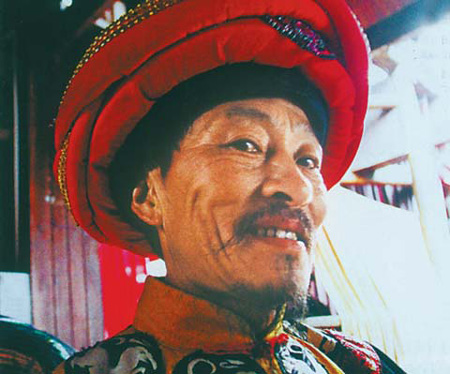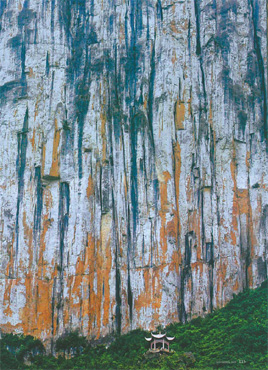Back to a bygone era
 |
|
An actor dresses up like an ancient Tusi chieftain of the Tujia people in Enshi prefecture, Hubei province. |
Travel back in time to a little known prefecture in Hubei province, which is home to the Tujia minority.
Enshi is a little known prefecture in southwestern Hubei province, bordered by the Yangtze River to the north and Hunan province to the south.
Even people elsewhere in Hubei seldom visit the place. Its residents live a simple, insular life, surrounded by mountains that have kept Enshi off the national rail network.
|
|
|
Some 60 km from Enshi is Mufu Canyon, that plunges more than 1,500 m. Photos by Li Feng |
Along the old street, houses with stone door-frames, brick carvings, blue-tile roofs and high walls, vie for my attention. Although the front gates are small, the houses are actually spacious inside, with some having as many as seven courtyards.
Many families run various small businesses in the lanes branching out of the main street. At a rice noodle restaurant, Old Yang in his late 60s is puffing on a pipe made from bamboo root. He says his ancestors moved here from Jingzhou, a city in southern Hubei province some 380 km from Enshi. They've been living here for five generations.
Like other restaurants here, Yang has placed a stove outside his eatery, where the local snack "ge ge" is steaming in round bamboo containers. The delicacy is a mixture of hot pepper and pork, beef, mutton or other meat.
Another popular dish is the "he zha" hotpot. Each small hotpot has peanut powder, minced pork and bean dregs as the basic seasoning. Customers can choose between slices of pork, mutton or beef to put into the spicy soup.
An enticing aroma leads me to a stove outside another restaurant. The owner hands me a small pancake, stuffed with the most mouth-watering meat I've ever had.
At a noodle shop next door, three women put down their shoulder poles and sit at a small table. They laugh and chat over some simple but appetizing noodles. The owner's ginger-colored cat lies coiled in a nearby chair, fast asleep.
Across a narrow path between two houses, I find myself on the verge of a cliff, facing the Lianzhu ("Connected Beads") Pagoda atop the densely wooded Wufeng ("Five Peaks") Mountain. The crystal clear Qingjiang River runs by at the foot of the cliff.
After wandering among the lanes, I finally find myself at the giant southern gate tower. Although time has eroded its grandeur, the solid structure still looks majestic, towering over nearby houses.
Some elderly people sit on stools inside the stone path, leading from the city gate. The stone slabs are smooth and shiny, witness to the number of people who have walked on them.
I find a narrow staircase leading to the city wall, lined by wild flowers. Surprisingly, several families have settled in the tower above the gate. In ancient times, this was where generals commanded their troops to fend off enemies.
However, inside the gate, the old city center has been given a makeover. The old houses have been replaced by concrete and cement structures that look no different from those in other small cities across the country.
 0
0 








Go to Forum >>0 Comments